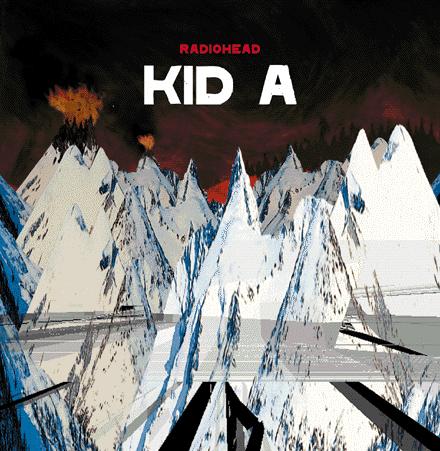The Radiohead Model, Chapter 4: Everything In Its Right Place

*MP3: Radiohead - "Everything In Its Right Place"
*MP3: Radiohead - "The National Anthem"
A well-known trope in the history of popular music is that no one artist has been able to fully duplicate the exponentially adventurous and innovative catalog arc which The Beatles produced in the 1960s. Certainly, the example lingers like a ghost in the closet of every British band which has come after, and following the ridiculous critical and commercial success of OK Computer, the specter of Sgt. Pepper loomed near Radiohead's own arc. But The Beatles were successful because they had George Martin, Abbey Road, and the brass balls to make the White Album. Radiohead had Nigel Godrich, Oxford, and the audacity to make Kid A.
After the hullabaloo of trying to tour behind OK Computer, Radiohead disappeared for a while. The band was exhausted, and Thom Yorke, disillusioned and depressed, began suffering from writer's block. The good news was that after OK Computer, EMI would never touch the band again, which suited the band just fine. Fed up with obligations, dogged tours, and the publicity machine in general, Radiohead did what few ascending rock bands have been able to do successfully: they stepped back, rebooted, and shifted direction.
After the initial recording sessions proved fruitless, the band hunkered down in their newly-built studio in Oxford, put down their guitars, and picked up just about everything else. Recorded at the end of the '90s and released in October of 2000, Kid A, much like the White Album, was a convergence of vision, a cut-and-paste molding of the musical ideas of our time. Often cited as an entry point for novices into the underground of electronic music, it is also a conduit for jazz elements, electronic sampling, and orchestral arrangement. Jonny Greenwood's beloved Ondes Martenot makes its first appearance. Drummer Phil Selway is conspicuously absent for most of the album. And the tenor, the vibrato, the timbre of Thom Yorke's voice is seemingly dead, its bifurcated ashes scattered across layers of electronic programming.
With its simultaneously intimate and expansive sound, Kid A is an isolating record that sounds like the environment in which it was created: Kid A is Oxford.
It's well-thought-out ideas and brainy application. In Oxford, the place where the former members of On A Friday still rehearse and record much of their music in the same way they always have, Radiohead could isolate themselves and shut out every influence but those they needed to create Kid A. Kid A needed to be created in vacuum. You can hear it on opening track “Everything in its Right Place”– a shock to the ears after everything that has come before – in the way Nigel Godrich pushes the keyboard riff and Yorke's distorted vocals to the front, pressing against your ears. Everything is in its wrong place, but somehow right.
Radiohead recorded 30 songs in this manner, but decided against a double album, taking a left turn even from The Beatles and stripping away egotistical excess. Kid A was released to the world as a lean, 10-song fuck off, and became the weirdest record to ever reach number one on the Billboard charts. With EMI's blessing, Radiohead became the first band to use the Internet, then still a primordial thing, as a full-on marketing tool. Though it leaked to Napster, Radiohead made their own presence felt with downloaders, releasing promotional videos using the new iBlip widget for album preorders and advanced streaming audio, an unheard of tool in the ignorant and newly litigious music industry.
Radiohead did very little else to promote the album. Their tour schedule was now shorter and more manageable. They could choose when and to what to degree to talk to the press. They appeared on Saturday Night Live in the U.S. in a deliberately terrifying but enthralling performance that sold even more records. Critics were divided but largely ecstatic about the album and the sea change it harbored. Radiohead wasn't just a very good rock band. They were experimental epoch makers who were successful. “We were The Beatles for a week,” said Thom Yorke.

*MP3: Radiohead - "Pyramid Song"
*MP3: Radiohead - "Morning Bell/Amnesiac"
In a year, the band would release Amnesiac, a collection of leftover songs from the Kid A sessions. Hardly tossed off, the album was an affirmation of experimental intention and, unlike Kid A, produced singles. Some would come to regard it as remnants off an eaten plate, but most would acknowledge it as a victory lap for a band that had disappeared completely, reappeared as something much less accessible, and somehow had more success than before.
Radiohead had become the amnesiac, forgetting its past and ricocheting headlong into the 21st century. Turning inward, it had grown outward and become the leader of the popular music world. But the crown weighs heavy, especially for those would rather not be the Bony King of Nowhere.
Further Reading:
The Radiohead Model, Chapter 3: An Interstellar Burst
The Radiohead Model, Chapter 2: If I Could Be Who You Wanted
The Radiohead Model, Chapter 1: Anyone Can Play Guitar
(Erik Martz/Ian Anderson)
Labels: Radiohead, The Radiohead Model.

2 Comments:
these radiohead essays have been a great read. i've always been a huge fan, but my fondness of the band was always very visceral; with hip hop, i can deconstruct everything and talk about its bits and pieces endlessly, but with music like this i'm usually a few steps removed... i just "like it because it's pretty" or whatever.
but this series y'all have been doing is very cool and eye-opening. looking forward to more!
well done.
Post a Comment
<< Home